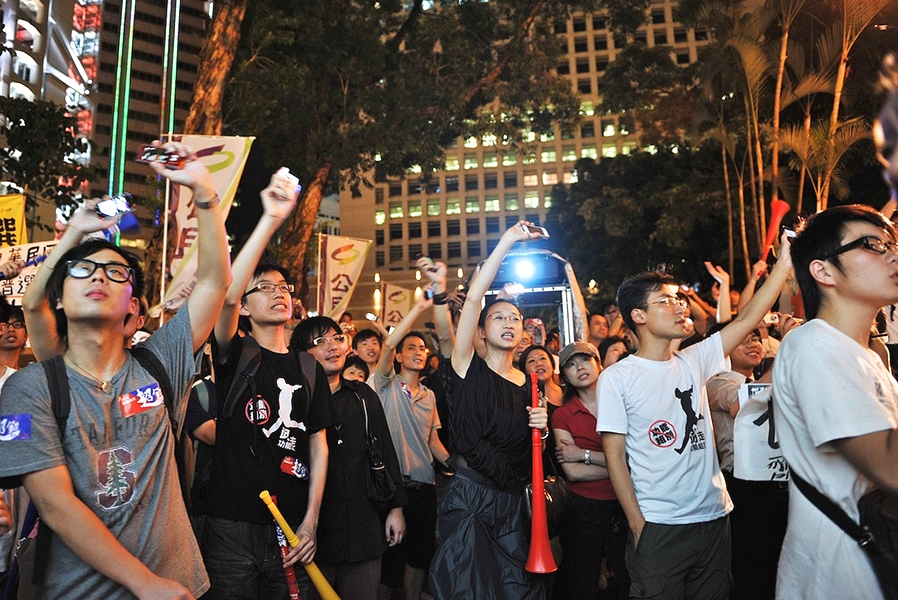Hong Kong’s youth are scarcely known for being political animals: little wonder, given the example set by their pragmatic elders. Doing well at school, finding a decent job and getting their hands on the latest iPhone tend to be higher priorities than politics. Yet a breed of young activists is challenging the presiding apathy, riding a wave of political activism that is sweeping the city. An unofficial ballot on electoral reform that ended on Sunday drew almost 800,000 votes, while an activist threat to “Occupy Central,” the main business district, hangs in the summer air. The annual July 1 protest march drew a large turnout; though peaceful, it ended in over 500 arrests, mostly of students.
A timely documentary, now showing in Hong Kong, portrays two of the young rebels. Joshua Wong is a “rock star” among young activists, as Li Ping Kong, a producer of “Lessons in Dissent,” puts it. In 2011, at 15, Mr. Wong founded Scholarism to fight against the government’s proposed “Moral and National Education” curriculum. With their allies, the secondary-school protest group decried the government’s plans as an attempt to peddle patriotic, pro-Communist party propaganda through, for instance, teaching a distorted version of history.
The film follows Mr. Wong as his movement gains momentum and he achieves celebrity. On street corners and in front of mass crowds, the teenager rasps and rails against Hong Kong’s leaders and their policies. Mr. Wong leads youthful activists in chants (“I want independent thinking, not brainwashing!”) and even a pre-protest prayer (“Dear Father… please guide us on our way so we won’t get pepper sprayed”), capturing both his winning wit and devout Christianity. He balances homework with hounding Hong Kong’s Chief Executive, C.Y. Leung, and chatting to sympathetic talk-show hosts.
Mr Wong’s media profile is surely his most powerful weapon. Also underpinning Scholarism’s effectiveness, like that of other youthful activist groups around the world, is its digital savvy: Facebook, especially, has played an important role. (Fame brings Mr. Wong unwelcome attention, too: in the heady summer of 2012 the fresh-faced activist fretted that his mobile phone seemed to have been tapped.)
If the clean-cut Mr. Wong fits the image of the son a Hong Kong parent might want, long-haired Ma Jai, the other activist featured in the documentary, often provokes the opposite reaction. More radical, he gets embroiled in clashes with police and is even arrested (as he was again after the most recent march). As Mr. Wong’s star rises, Mr. Ma stays in the background, shifting protest gear. This leaves the film feeling somewhat unbalanced.
“Lessons” clearly sympathizes with the rebels and their radical allies: Those with more conventional political positions are given short shrift (though this is testament partly to Mr Wong’s skill in mercilessly dispatching older debating foes). But the documentary nicely evokes the impressively restrained passion, amid infernal heat, of those summer protests.
It ends shortly after the culmination of the anti-national education campaign in September 2012. After Scholarism and others took their tents and besieged government headquarters, the government made teaching the subject optional, giving Mr. Wong and his fellows an apparent victory. Yet that now looks hollow. Detractors complain much of the offensive content has made its way into classrooms by other means, while Scholarism has left education issues behind. Ructions within the group resulted from the decision to switch its focus to campaigning for universal suffrage.
It does so in increasingly daring fashion. Whereas Scholarism once eschewed protesting without police permission, it now aims to foster acceptance of civil disobedience, says one prominent member, Derek Lam (Mr. Wong elaborates in a New York Times video). Those Scholarism activists who, after Sunday’s march, camped overnight at Mr. Leung’s office to harangue him, fully expected to be arrested, says Mr. Lam. Instead, the police cannily avoided detaining them.
Older students who took over a park were not spared arrest. “Perhaps Scholarism’s greatest effect has been to radicalize the university students,” says Matthew Torne, the British filmmaker behind “Lessons.” In 2012, just a handful of them marched to the central government Liaison Office, a frequent target of protesters’ ire, after the annual vigil on June 4 for victims of the 1989 Tiananmen Square crackdown, he notes. In 2014 they led the way. (Scholarism’s influence even extends to young protesters in nearby Macau.)
Most young Hong Kongers still do not take readily to the streets. But in recent times they have grown more politically aware; doubtless, Scholarism and its fellow travelers can claim some credit for this (though the central government’s heavy-handedness deserves more). How long a single-issue campaign group that morphs into a pro-democracy force can survive, however, is questionable. Its fate rests heavily on the shoulders of one 17-year-old; admirers who approach him in the street often tell Mr. Wong they too are relying on him. It is a lot to ask of one young man, no matter how charismatic or committed.
3 WAYS TO SHOW YOUR SUPPORT
- Log in to post comments














